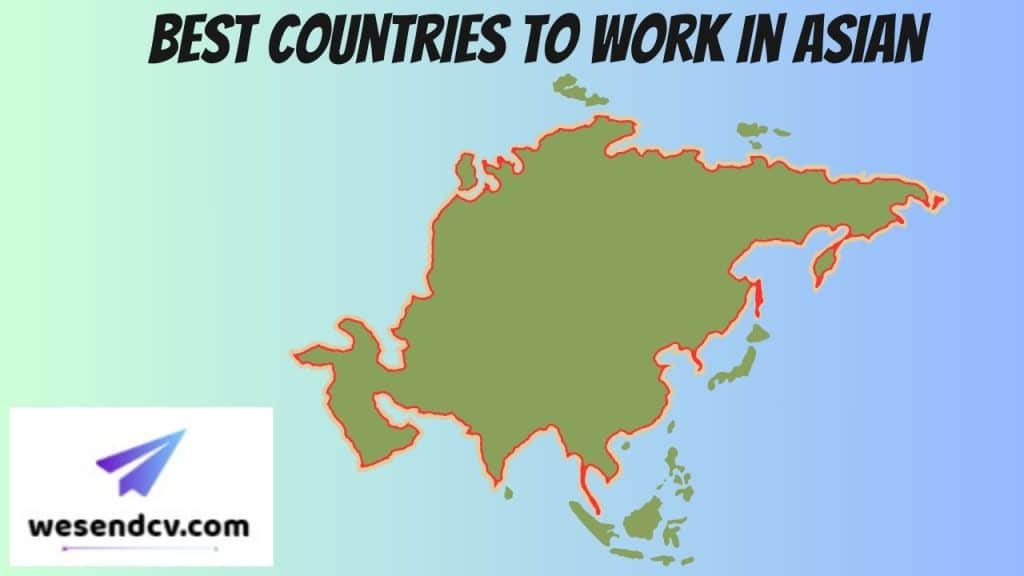With Asia’s economic power growing, professionals worldwide are considering moving to the region for its work opportunities, unique cultures, and often lucrative job prospects. Each Asian country brings its own benefits, ranging from high salaries to fast-paced cities to tranquil work-life balance options. Here’s an in-depth look at the best Asian countries to work in 2025, with insights on the unique opportunities and work cultures in each.
Main Highlights of Content
Toggle1. Japan: Innovation and Work Culture at Its Peak
Why Japan?
Japan remains a global leader in technology, manufacturing, and robotics, making it a top destination for professionals in these industries. Known for its blend of traditional culture with cutting-edge advancements, Japan offers a unique work environment for ambitious professionals.
Work Opportunities
The job market in Japan is thriving, especially for those skilled in technology, engineering, and design. Sectors like AI, robotics, and finance are actively hiring foreign talent to fill skill gaps. English teachers and language professionals are also in demand.
Key Benefits:
- Highly organized work culture and emphasis on quality.
- Opportunities for skill development in tech and manufacturing.
- High standard of living and excellent public services.
Challenges:
- Language barrier; learning Japanese is essential for long-term career growth.
- Traditional work practices that emphasize long hours.
2. Singapore: The Hub of Business and Finance
Why Singapore?
Singapore’s stable economy, favorable business environment, and reputation as a financial powerhouse make it one of the best places to work in Asia. Known for its efficiency and high salaries, Singapore is home to many multinational companies and offers numerous opportunities in finance, technology, and healthcare.
Work Opportunities
Singapore is a top choice for professionals in banking, IT, healthcare, and logistics. With its highly globalized economy, Singapore attracts talent from around the world.
Key Benefits:
- English is widely spoken, easing communication for expats.
- Low tax rates and strong currency.
- Excellent infrastructure and high standard of living.
Challenges:
- High cost of living, particularly in housing.
- Competitive job market with high expectations for performance.
3. South Korea: Tech Innovation and Dynamic Work Environment
Why South Korea?
South Korea is recognized for its advancements in technology, electronics, and entertainment, making it a desirable place to work for tech enthusiasts and creative professionals. With tech giants like Samsung and LG headquartered here, South Korea offers a fast-paced work environment.
Work Opportunities
Tech and IT, especially in mobile technology, software development, and gaming, are among the top job sectors. There’s also demand in fashion, beauty, and entertainment-related fields.
Key Benefits:
- High-speed internet and tech-friendly workspaces.
- Rich cultural experiences in K-pop, fashion, and cuisine.
- High-quality healthcare and public services.
Challenges:
- Long working hours and intense work culture.
- Language learning is beneficial for effective communication.
4. United Arab Emirates: High Salaries and Tax-Free Income
Why UAE?
The UAE, particularly Dubai and Abu Dhabi, is known for high salaries, tax-free income, and a lifestyle that combines luxury with convenience. The UAE has invested heavily in making itself a global hub for business, tourism, and finance, making it attractive for professionals in many sectors.
Work Opportunities
Finance, construction, oil and gas, IT, and tourism are the UAE’s main employment sectors. There’s a growing demand for professionals in digital marketing, data analysis, and e-commerce as the region diversifies its economy.
Key Benefits:
- Tax-free income and high salaries.
- International work environment with a large expat community.
- Warm climate and luxury lifestyle options.
Challenges:
- High cost of living, particularly in rental housing.
- Cultural adaptation, particularly with work practices and social norms.
5. Hong Kong: Finance and International Business
Why Hong Kong?
As a major financial hub, Hong Kong has a thriving economy and is home to many multinational companies, particularly in banking, finance, and international trade. It’s a city that values work efficiency and offers diverse career opportunities.
Work Opportunities
Finance, banking, insurance, and real estate dominate the job market. There’s also demand in trade and shipping due to Hong Kong’s strategic location.
Key Benefits:
- High salaries and generous compensation packages.
- English-friendly work environment.
- Great connectivity to other major Asian cities.
Challenges:
- High cost of living and expensive housing.
- Competitive work culture with long hours.
6. Malaysia: Balance Between Work and Lifestyle
Why Malaysia?
Malaysia offers a more balanced work-life approach compared to other Asian nations. Kuala Lumpur has become a financial and IT hub, making it a good destination for those looking for both career opportunities and a slower pace of life.
Work Opportunities
IT, finance, and engineering are prominent sectors, with healthcare and education also growing. Malaysia’s tourism and hospitality industries are vibrant, offering a range of job opportunities.
Key Benefits:
- Affordable cost of living compared to other countries in the region.
- High English proficiency, simplifying the adjustment for foreigners.
- A diverse cultural scene and close proximity to beaches and natural sites.
Challenges:
- Lower salary levels than in countries like Singapore or the UAE.
- Limited high-level roles in specific fields due to a smaller economy.
7. China: Endless Opportunities in the World’s Second-Largest Economy
Why China?
China’s rapid economic growth has opened up diverse opportunities in sectors like manufacturing, tech, and finance. Cities like Shanghai, Beijing, and Shenzhen are buzzing with new businesses and emerging industries, attracting professionals worldwide.
Work Opportunities
Tech, engineering, manufacturing, and e-commerce are major job sectors in China. There’s also demand in education, especially for English teachers, and finance.
Key Benefits:
- High demand for skilled foreign professionals, especially in teaching and tech.
- Opportunities in an economy that’s always evolving.
- Vibrant cities with a unique mix of ancient culture and modern innovation.
Challenges:
- Language barrier; proficiency in Mandarin is beneficial for career growth.
- Fast-paced work culture with high expectations for productivity.
8. Vietnam: Emerging Opportunities and Growth
Why Vietnam?
Vietnam’s economy has grown steadily over the past decade, attracting businesses and professionals. Known for its affordable cost of living, Vietnam is a popular choice for those looking for career opportunities without high expenses.
Work Opportunities
Education, IT, manufacturing, and tourism are key sectors. There’s a growing demand for foreign teachers, software developers, and project managers.
Key Benefits:
- Affordable living costs and good quality of life.
- High demand for foreign professionals, especially in education.
- Friendly culture and beautiful landscapes.
Challenges:
- Lower salaries compared to other Asian nations.
- Limited job opportunities in senior-level roles.
9. Thailand: A Blend of Career and Lifestyle
Why Thailand?
Thailand offers a great mix of career opportunities and lifestyle. Bangkok has become a popular destination for digital nomads, while sectors like tourism, finance, and teaching offer more stable career paths.
Work Opportunities
IT, digital marketing, and tourism are the top sectors for foreign professionals. Teaching English is also a popular option.
Key Benefits:
- Affordable cost of living and a relaxed lifestyle.
- High demand for English teachers and skilled professionals in digital sectors.
- Excellent access to travel destinations around Southeast Asia.
Challenges:
- Limited high-paying job opportunities.
- Language barrier, although English is common in business settings.
10. Indonesia: Opportunities in a Rapidly Growing Economy
Why Indonesia?
Indonesia, especially Jakarta and Bali, is an attractive choice for professionals in digital marketing, tech, and hospitality. With a growing digital economy, Indonesia has plenty of opportunities for tech-savvy professionals.
Work Opportunities
E-commerce, digital marketing, and tourism are the biggest sectors, with plenty of room for growth in software development and project management.
Key Benefits:
- Affordable living costs, especially in smaller cities.
- High demand for foreign professionals in tech and tourism.
- Beautiful islands and beaches for a balanced work-life experience.
Challenges:
- Limited high-paying roles, especially outside Jakarta.
- Language barrier for certain industries.
FAQs
Q1: Is English necessary for working in Asia?
Most countries in Asia have a high demand for English-speaking professionals, especially in business hubs like Singapore, Hong Kong, and the UAE. Learning the local language, however, can be beneficial for cultural immersion and career advancement.
Q2: Which country is best for tech jobs?
South Korea, Japan, and Singapore are top choices for tech professionals, with robust job markets and competitive salaries in technology and innovation sectors.
Q3: How can I get a work visa in Asia?
Each country has its own visa requirements, often tied to specific industries or skill shortages. For example, Japan and Singapore have well-defined visa categories for skilled professionals.
Q4: What is the cost of living like in Asia?
It varies significantly. Singapore, Hong Kong, and the UAE have high living costs, while countries like Vietnam, Thailand, and Indonesia offer a lower cost of living.
Q5: Are there tax advantages in Asian countries?
The UAE is tax-free for income, while Singapore has a low tax rate. It’s best to research the tax policies of each country to understand how they might impact your income.
These top countries in Asia offer a variety of work environments, from bustling urban centers to relaxed, affordable cities. No matter your profession, there’s likely a place in Asia where you can thrive, both in your career and lifestyle. Whether you’re drawn to the innovation of Japan, the luxury of the UAE, or the balance of Thailand, Asia’s opportunities in 2025 are waiting.









